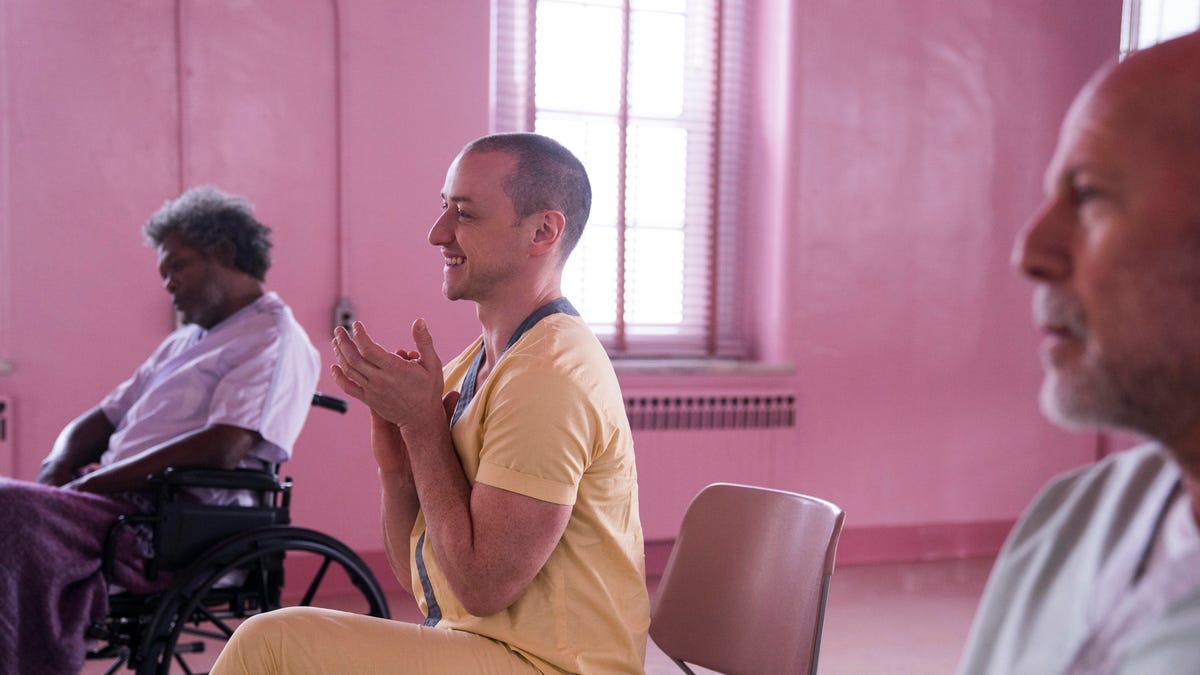Glass review: M. Night Shyamalan's superheroes aren't what you expect
Twenty years in the making, the sequel to Unbreakable has its powerful moments, but it ain't no Marvel movie.

You know what to expect from a superhero movie, right? Punching. Colorful costumes. Skyscrapers crumbling. More punching.
Not if M. Night Shyamalan has anything to say about it.
To say the storyline of Shyamalan's superhero team-up Glass is unexpected would be an understatement. It's less like a square-jawed superhero and more like Kevin Wendall Crumb, the villain with multiple personalities introduced in another Shyamalan offering, Split. It's fragmented, contradictory, frustrating and wildly unpredictable. Like many horror fans, I love to follow a writer's logic and guess what's going to happen next. Through years of watching movies, I'm usually not far off. But I was taken by surprise when I watched Glass, open in theaters worldwide now.
Samuel L. Jackson is Mr. Glass.
Glass is a sequel to both Split and Shyamalan's 2000 movie Unbreakable. Twenty years ago, we were introduced to David Dunn, played by Bruce Willis, who was the lone survivor of a devastating train crash. A kooky comics fan played by Samuel Jackson tried to convince Dunn he had superpowers, but in the final moments of the movie, Dunn realized the man who called himself Mr. Glass also fancied himself as a comic book character: a supervillain.
In Split, James McAvoy introduced Kevin Wendell Crumb and his 23 unique personalities. In Glass, these three extraordinary individuals are thrown together, their fates intertwined as Crumb and Dunn become pawns in the game of Mr. Glass.
You won't see buildings collapse or crowds of people running away in fear. Instead, Shyamalan plays around the gray area between humanity and superpower -- and delusion. Both the characters and the audience are teased with ambiguity about the powers of these individuals. You might find yourself pondering whether it's their unusual skills or their moral convictions that make them heroes or villains, but it's not a question the film shows much interest in.
I can't say much without spoilers, but Glass will keep you guessing. While promising superhistrionics, it takes our three heroes to a secure ward where they're treated by Sarah Paulson's psychiatrist. It would be easier to buy into the psychological battle of wits that follows if the psych hospital was even vaguely realistic. The eye-rollingly lax security undermines the tension of the story.
Samuel L. Jackson, James McAvoy and Bruce Willis in Glass.
Jackson and Willis don't have much to do, so it's a testament to their sheer presence that they still hold the attention every time they're on screen. But McAvoy almost runs away with the movie as he cycles between funny and scary and sympathetic personalities each second. One thing other superhero movies can learn from Glass is that you don't need wall-to-wall CG to create compelling comic characters. It's stunning to see McAvoy transform from nervy child to incredible hulking psychopath with just a roll of his formidable trapezoids, putting CG-enhanced characters to shame.
Meanwhile, Shyamalan plays with the format and familiarity of superhero movies while throwing in a few of his signature swerves. The fights, in particular, are artfully shot, although you might expect more of them. That's the dangerous game Shyamalan plays in Glass: you can only tease audiences with promises of superhero action if you deliver something even more interesting.
And Glass doesn't always succeed.
The climax feels drawn out and short on stakes, especially as the secondary characters are just sort of there. It's nice to see Anya Taylor-Joy return from Split, and there's a genuine charge in seeing the now fully grown Spencer Treat Clark alongside footage of him as a vulnerable child in Unbreakable. But these characters aren't very active in driving the slight story along.
The ending is frustrating -- I felt as if a huge rock was pressing down on my chest when the credits rolled. However, it also triggered my imagination on what may happen if there's a next film, and I started guessing again. I have a strong feeling this may become a universe of its own, but vastly different from Marvel and DC stories. Shyamalan's characters hit close to home -- they're not born of lab accidents, alien planets or advanced technology, they become who they are because of pain and hardship. If there's anything superhuman about them, it's their fight against their own flaws.
I promised a spoiler-free review, so I'll leave everything to your imagination. But before you close this window, let me ask you a philosophical question: Would you prefer a world with superhumans or the world we have right now?
Culture: Your hub for everything from film and television to music, comics, toys and sports.
Movie Magic: The secrets behind the scenes of your favorite films and filmmakers.

